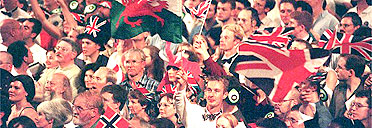
Running the Proms has to be one of the plum jobs in the musical world. While most festival directors are forced to spend a huge amount of their time drumming up sponsorship, the Proms director Nicholas Kenyon, safe in the knowledge that the BBC is generously underwriting all his projects, can concentrate on the creative parts of his role. He may have over 70 programmes to put together, but there is the cream of the world's singers and players to choose from, as well as the considerable expertise of the BBC's house orchestras.
During his tenure Kenyon has been canny in the way he has made use of the Proms' iconic significance, and been careful never to threaten its privileged position in the cultural fabric. So in this year's programme, announced two days' ago, the Queen's Golden Jubilee is fulsomely acknowledged.
First, by the commissioning of a collection of settings of living poets as a contemporary counterpart to The Triumphs of Oriana, which was assembled at the beginning of the 17th century as a tribute to Queen Elizabeth I; and second - by another collective endeavour - on the Last Night, when an international line-up of eight composers will join forces to produce a set of variations on a theme by Henry Purcell.
The latter is the one real innovation in the Last Night, bizarrely being relayed to a giant outdoor screen in Belfast, all in the name of "unity", according to Kenyon. This year the Irish peace process, next year the Middle East. After last year's radical rethinking of the format in the wake of the events of September 11, it is business as usual again with Land of Hope of Glory, Henry Wood's Fantasia on British Sea Songs and Jerusalem back in their hallowed positions. That is definitely an opportunity lost to do something radical.
At least the overarching theme of the whole season promises some interesting discoveries - Spanish music threads its way through the programmes. There are composers from Albeniz to Victoria and lots of Manuel de Falla, including a performance of his La Vida Breve complete with flamenco dancer, singer and guitarists.
Some music from Latin America squeezes in under that banner too, and a complete performance of Silvestre Revueltas's film score La Noche de los Mayas is a belated acknowledgement of a much underrated Mexican composer.
With sad predictability the Walton centenary also bulks large - the opening night includes Belshazzar's Feast - but the Richard Rodgers, far more worth celebrating than that of Oldham's most famous son, gets a look in as well, with a programme that ends with a concert performance of Oklahoma!
Otherwise it is the usual mixture of repertory works and sometimes less familiar scores, though without quite the glitz and glamour that we have come to take for granted. Riccardo Chailly is bringing the Royal Concertgebouw Orchestra for a performance of Mahler's Third Symphony, Claudio Abbado is appearing with the Gustav Mahler Jungendorchester and Esa-Pekka Salonen with the Los Angeles Philharmonic, and there is a weekend from Valery Gergiev and the Kirov Opera.
Otherwise the line-up of top international bands is not quite up to previous years; perhaps we have been spoilt. The Kirov's visit at least brings one of the more interesting new-music events of an otherwise very ordinary-looking season for living composers, with the British premiere of Sofia Gubaidulina's evening-long St John Passion.
If this year's concerts are for once blessedly free of John Tavener and James MacMillan, the range of commissions and other premieres is disappointing. The two collective works aside, there are just three specially commissioned pieces in the main Albert Hall season - from Anthony Payne, David Sawer and Mark-Anthony Turnage - with a piece by Joseph Phibbs featured in the satellite series of lunchtime chamber music concerts in the Victoria and Albert museum.
In a total of 81 concerts that seems to me a pretty puny effort, and even when the list of local premieres is included (by Anderson, Bainbridge, Harle, Norgard and Sierra), as well as a concert performance of Oliver Knussen's two Sendak operas to mark the composer's 50th birthday, the representation of living composers is shamefully small, almost tokenistic.
Pierre Boulez may be conducting two of his own works in a concert with the BBC Symphony Orchestra, but both of them date back more than 50 years, and one looks in vain through the programmes for any trace either of the great figures of Boulez's generation, or of their more distinguished successors.
In an orchestral concert series of such scope it should surely be possible to deal with new music more comprehensively than this, and to ensure that there is at least one large-scale commission from a major international composer every year.
Safeguarding a tradition, which for whatever reason seems so important to the Proms, shouldn't just be about curating the past, but about giving it a contemporary relevance too.

